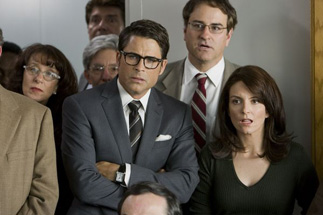Movie Review: The Invention of Lying
By Matthew Huntley
October 12, 2009
BoxOfficeProphets.com

Then, one day, an electrical spark goes off inside the head of Mark Bellison (Ricky Gervais) and he's able to tell a lie. His ability makes him the most powerful person on Earth and he's soon talking to others about "the man in the sky" and reading quasi-commandments off the back of pizza boxes (I'd have to see the movie a second time to be sure, but I don't think the word "God" is ever spoken).
Mark exploits his newfound power to win millions, buy a luxurious mansion and spend his days lounging around with his sluggish friends (Louis C.K. and Jonah Hill). He has everything he could possibly want, except, of course, the woman of his dreams (Jennifer Garner). But if Mark is to successfully woo her, he wants it to be for the truth.
Beneath this light and breezy parable rests a hard and biting commentary about the lies we all tell as part of our daily living. When I say "lying," I don't mean simply not telling the truth; I'm talking about how we all make things up to feel better. Most of the time, we don't even know we're lying. According to this film, our self-expression and imagination are rooted in lies (because they signify who we want to be, not who we really are) and serve as our natural drugs to take away the pain, anxiety, and stress of real life. We also lie when we're being polite to others, mostly when we hold back our real thoughts and feelings.
This all begs the question, why can't we really express our pure thoughts all the time? Why must we always pad what we say just to compensate for our and other people's feelings? Doesn't everyone always want to hear the truth? Surely we all know people are restraining themselves just to spare us.
In the movie, Anna (Garner) and Mark go on a date and she says she won't be sleeping with him because he's fat, poor and lacking self-confidence (she says this sitting across the table from him). Meanwhile, he flat out tells hers he's intimidated by her. If statements like these are all truthful, why can't they be said? Are we all afraid to hear the truth?
These are some of the questions I wish The Invention of Lying had attempted to answer instead of descending into a just another romantic comedy. I wanted more insight into why we're conditioned to lie to ourselves and others. I also wanted the movie to take a position on whether it condones lying or telling the naked truth. It seems to be on the fence and afraid to admit it might pardon lying because it's generally thought of as immoral. But if it really thinks we need lies to sustain ourselves, why can't it proclaim it or even argue for it? Or, if it thinks we should all just tell the blunt truth, no matter how much it hurts, why not say so?
If the movie was gutsier and more outspoken about its standards, it wouldn't have been so dry. Gervais, who shares writing and directing credits with Matthew Robinson, is so irreverent and frank in real life that it would have been nice if he projected a similarly forceful attitude on screen.
As it is, The Invention of Lying has an intriguing and challenging concept but ultimately plays it safe. It doesn't want to step too far in one direction out of fear it might offend some members of the audience. On one level, it wants us to think it's sweet and warmhearted, and it sometimes is, but on another, I can't help but think it's more cynical and has a greater contempt for human nature. But even if it doesn't, the movie can't seem to express how it really feels about lying and winds up a bland and apathetic comedy. If it feels a certain way, then it shouldn't pretend to be something else. Otherwise, it's just lying to itself.